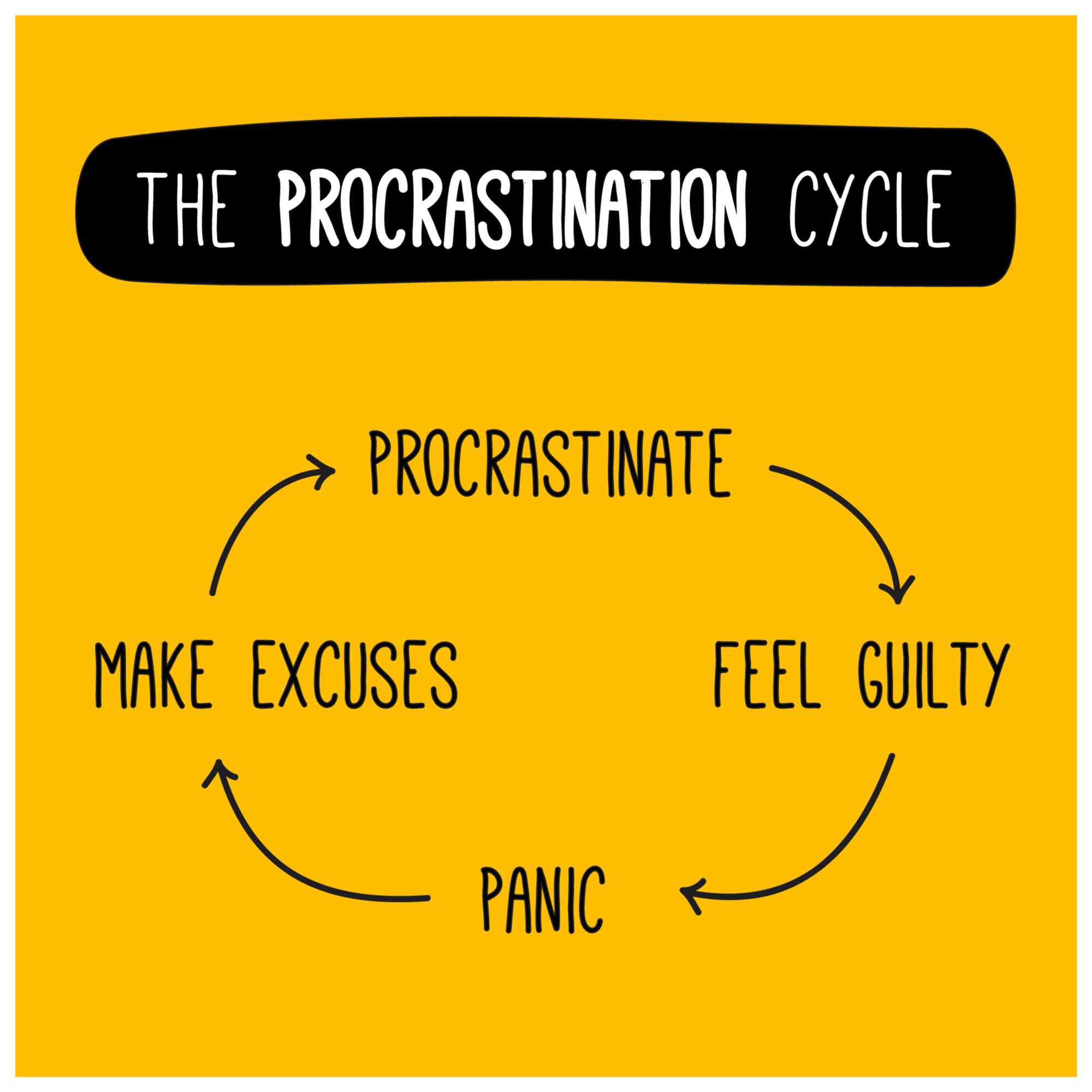
From Procrastination to Productivity
You may have heard the famous saying, “Procrastination is the thief of time.” Are you a student who has gained the reputation of a ‘procrastinator?’ Handing over assignments at the last minute and not sleeping before the impending deadline, yet getting them done at any cost? You are not alone. The shocking truth is that 75% of college students consider themselves procrastinators, while 80% to 95% admit to procrastinating at least occasionally. About 50% of them engage in chronic procrastination. The pull of procrastination—University Affairs
Reasons for Procrastination
When asked, students give various excuses to justify procrastination.
- I am unable to figure out what needs to be done.
- Not knowing what to do when faced with a new task
- Not wanting to do something if it is not governed by personal choices.
- Not being in the mood to do it
- A preconceived notion that you work better under pressure.
- Considering yourself a risk-taker, you can finish it at the last minute.
- Lacking the initiative and intention to get started
Discipline and willpower
Procrastination, if not regulated, can become a habit. Often, this habit is linked to a lack of motivation, focus, willpower, and discipline. Most people consider the word discipline a negative concept, linking it to punishment. In reality, discipline is a form of training that perfects mental capacity and even moral character. Since many parents and teachers resort to various forms of punishment, the negative association is inevitable. However, it is quite a revered trait, especially among athletes. They understand the importance of training their mind and body so that they can perform to the best of their ability. One of the greatest cricketers of our time, Sachin Tendulkar, says, “It’s mental discipline that sets one apart, the ability to think differently and to generate energy in the right direction.”
Willpower is a close companion to discipline. This is the energy that enables discipline to manifest. Sometimes there is no way of avoiding a task, and you feel that you have to grind through it, making you feel miserable. It is at these times that discipline and willpower have a reality-changing effect. It is important to do what we don’t love from time to time. Building resilience is critical in a world full of uncertainties. Hence, discipline is directly linked to our ability to plan, handle stress, and continue to stay focused.
Read More: Dual Enrollment
The reward for being disciplined
A famous test, the “marshmallow experiment,” demonstrated these links quite clearly. The experiment was conducted by Stanford professor Walter Mischel, who began conducting a series of important psychological studies. Calling children to a private room and offering them one marshmallow. The condition was that if they did not eat this one, they would get two marshmallows. Many kids succumbed to the temptation of “instant gratification,” and some others waited for a bigger prize.
As the years rolled on and the children grew up, the researchers conducted follow-up studies and tracked each child’s progress in several areas. What they found was surprising.
The children who were willing to delay gratification and waited to receive the second marshmallow ended up having higher SAT scores, lower levels of substance abuse, a lower likelihood of obesity, better responses to stress, better social skills as reported by their parents, and generally better scores in a range of other life measures. The Marshmallow Experiment and the Power of Delayed Gratification (jamesclear.com)
Practical strategies to overcome procrastination
The good news is that there are effective strategies to overcome procrastination that can set you free from stress and anxiety.
Goal setting
Setting goals provides direction for your mind. Did you know that your subconscious mind can help you achieve your goals? Our mind is a powerful machine, and understanding how it works is a big part of successful goal setting. Hypnotherapist Joseph Clough compares it to a GPS. Simply put, if you feed in an address to your GPS, it will take you to your destination. Hence, setting clear goals provides you with greater opportunities to accomplish them. When you start setting your goals, you take charge of your life. Whether it is about your subject choices, majors to do in college, your career, health, etc., you are empowering yourself. However, avoid the common pitfall of making lofty and unrealistic goals. Following the Specific, Measurable, Achievable, Relevant, and Timebound (SMART) framework will help you stay organized and focused.
Chunking
This makes large projects feel less overwhelming and provides a sense of progress as each small task is completed. If you order a 9-inch pizza, do you finish it in one go? No! Right? This rule works even when you have a task. When we work with a student on their projects and research work, we regularly guide them on how to break their tasks into bite-sized pieces. This sends a signal to the brain that it only needs to focus on a small part of the task.
Study Smart
Using methods such as the Pomodoro Technique, Spaced Repetition, Active Recall, Feynman Technique, etc. can considerably improve productivity. For example, the Pomodoro technique, which involves working in focused 25-minute intervals followed by short breaks, can improve productivity and reduce the tendency to procrastinate.
Decluttering
Creating a supportive environment for productivity is another key strategy. This can include decluttering your study area, minimizing digital distractions, and surrounding yourself with motivated individuals who encourage good habits.
You are not alone in facing the challenge of procrastination, but it doesn’t have to define your academic journey. By embracing discipline, harnessing your willpower, and setting clear, achievable goals, you can start to shift away from last-minute scrambles and towards a more focused, productive approach to your studies with Ivy Central.








